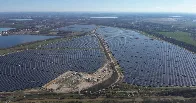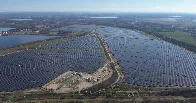Solar module production isn't labour-intensive, much less intensive in low-skill labour.
A bit more than a decade ago, Germany was the #1 producer of solar panels, drastically pushing down prices with advances in technology, manufacturing, and automation. Then the government decided to slash all subsidies (mostly about capping feed-in tariffs for solar), without warning, and without phase-out. Noone was prepared for that kind of thing so all the companies went belly-up and the Chinese swooped in, buying the tech for cheap with money borrowed from the Chinese taxpayer and began to produce panels and sell them, again subsidised by state coffers. We later slapped them with anti-dumping tariffs but by then the domestic industry was already decomposing.
It'd stiff be cost-effective to build solar panels in Germany, the degree of automation is so high that higher wages balance out with higher transportation costs.
Australia though don't get me started on Australia you're structurally a 3rd world economy reliant on export of raw goods. You're not even smelting that ore, just shovelling it onto ships.



